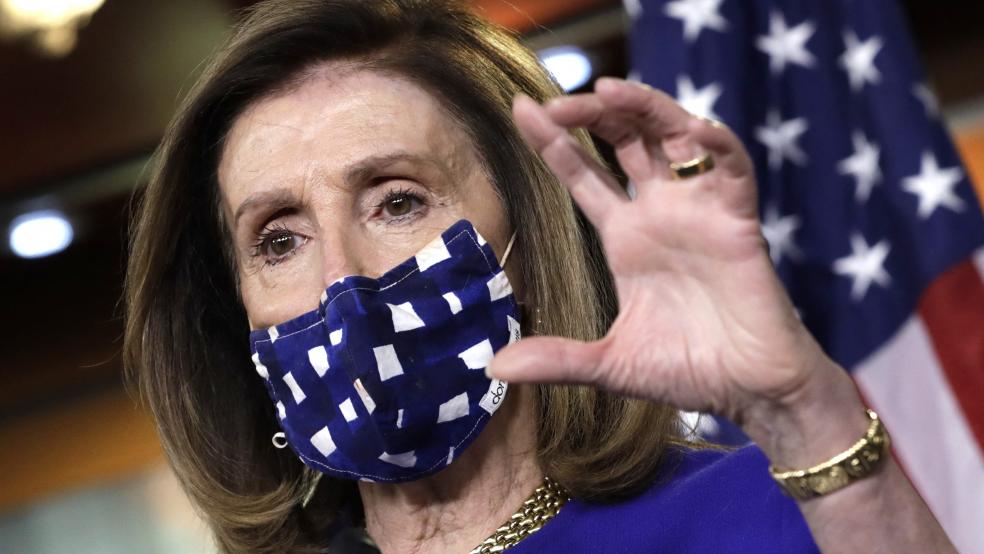House Speaker Nancy Pelosi (D-CA) and Treasury Secretary Steven Mnuchin said after a nearly 90-minute negotiating session Thursday that they had made some progress toward a coronavirus relief package. In particular, they said that the White House would accept Pelosi’s demands regarding language for a national coronavirus testing plan, with only “minor” changes.
Don’t get your hopes up, though.
Pelosi told fellow Democrats that, even as the two sides near agreement on that issue, they remain split on other elements. “Many other disagreements remain,” Pelosi wrote in a letter to House Democrats Thursday evening. “These include but are not limited to funding for state and local government, tax benefits for working families, support for vulnerable small businesses, and child care funding.”
Pelosi added that the White House proposal “contains multiple deadly poison pills,” including a provision shielding businesses from coronavirus-related lawsuits, which Pelosi said “forces workers to risk their lives in unsafe workplaces with no legal recourse.”
White House economic adviser Larry Kudlow on Friday said that Pelosi was moving the goalposts in talks, suggesting she doesn’t really want to compromise. Kudlow told Fox Business that, even if the parties reach a deal, it would be “almost impossible” to pass a comprehensive relief package before the November elections. "Maybe some of it could be executed," he said. "But you certainly couldn't get a grand, large deal.”
As we mentioned before, Senate Republicans remain a significant obstacle. Senate Majority leader Mitch McConnell made clear yesterday that his caucus objects to a package as big as the $1.8 trillion or more that Trump has proposed in urging lawmakers to “go big or go home.”
“He’s talking about a much larger amount than I can sell to my members,” McConnell said Thursday. McConnell plans to put a roughly $500 billion package on the Senate floor next week.
"What I’m going to put in the floor is what Senate Republicans, 52 out 53 of us, feel like is an appropriate response," McConnell said. "You are correct there were discussions going on between the secretary of the Treasury and the speaker about the higher amount. That’s not what I’m gonna put on the floor.”
Would presidential pressure make a difference? Administration officials suggested that Trump could overcome those objections. “If Speaker Pelosi wanted a deal I think we could round up enough Senate Republicans to get a deal,” Kudlow said Friday. Mnuchin similarly suggested that Trump would press McConnell if a deal was reached. “The Secretary indicated that the President would weigh in with Leader McConnell should an agreement be reached,” a Pelosi spokesman wrote on Twitter, describing Thursday’s talks.
It’s not clear how much influence Trump could have at this point. “Trump’s erratic approach to the negotiations makes it uncertain whether he can or would exert the necessary political pressure to move Senate Republicans to take a vote many of them do not want to take, especially at a moment when the president is down in polls and some Republicans have begun to distance themselves from him,” The Washington Post reports.
Trump himself said at his NBC town hall Thursday night that he hasn’t yet pressed Senate Republicans, blaming Pelosi for the lack of a deal. Talking Points Memo highlighted this exchange:
“I’m ready to sign a big beautiful stimulus,” Trump told NBC News’ Savannah Guthrie.
“Are Senate Republicans with you?” Guthrie asked.
“They’ll go,” Trump responded.
“So far, they have not said they would,” Guthrie pressed.
“Because I haven’t asked them to, because I can’t get through Nancy Pelosi,” Trump said.
Trump’s changing positions appear to have only strengthened Pelosi’s resolve to secure a larger deal. The Post reports that Pelosi told members of her caucus Thursday afternoon that Democrats now have “maximum leverage” to get the package they want.
“The president’s even said this morning that he wants more. He said the night before that, ‘Go big or go home,’” Pelosi reportedly said.
“So, this is not the time to say, ‘Okay, let’s fold.’ This is what we have been building up to.”
The bottom line: Mnuchin is expected to travel to the Middle East in the coming days, so while the two sides are still talking, a deal isn’t likely to come together quickly.





